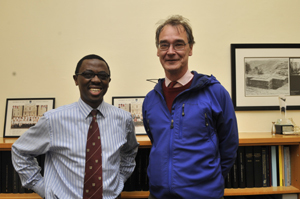New consortium will build African health research capacity
24 August 2009
UCT will play a pivotal role in the Southern African Consortium for Research Excellence (SACORE), one of seven new international consortia formed by the Wellcome Trust's African Institutions Initiatives to develop local institutional capacity and health research.
Underpinned by £30 million (R420 million) in funding from the trust, this initiative includes more than 50 institutions from 18 African countries, and hopes to get African universities more involved in African health research endeavours.
Home to some of the poorest countries in the world (the bottom-ranked 25 countries are in Africa), the continent carries a high burden of disease, particularly HIV, TB and malaria.
The seven consortia will be led by African institutions, with partners in Europe, the US and Australia. Their task will be to build a critical mass of sustainable local research capacity by strengthening universities and research institutions and developing vital networks.
SACORE's director is Dr Newton Kumwenda of the College of Medicine in Malawi. Other partners include Zambia, Zimbabwe, Botswana and the UK. UCT is one of an inner ring of supporting partners, via the Clinical Infectious Diseases Research Initiative (CIDRI) in the Institute of Infectious Disease and Molecular Medicine (IIDMM).
The institute's Professor Robert Wilkinson, a senior Wellcome Trust Research Fellow, said that while each consortium operated independently, common goals were leadership training and professional development, the provision of PhD and postdoctoral fellowships, and the provision of up-to-date equipment.
Two intermediate tutor posts have been established to train SACORE trainees who come to UCT. There is also funding for two courses in laboratory methods.
A joint meeting between CIDRI and the Malawi programme, to be held in that country from 30 August to 2 September, will provide an opportunity to kick-start the SACORE venture.
In addition, CIDRI will fund four young scholars, Emmanuel Chigutsa, Patrice Gqamana, Rebecca Tadokera and Johan van der Watt, to perform further research on infectious diseases prevalent in Southern Africa.
The boost will "establish them on the research ladder".
"CIDRI anticipates making up to 25 such awards in the next three years or so," said Wilkinson.
The Wellcome Trust has also awarded R11 million to Honorary Associate Professor Stephen Lawn to continue his HIV research at UCT, in conjunction with the London School of Tropical Medicine and Hygiene and the IIDMM's Desmond Tutu Centre for HIV Research.
A prize fellowship was awarded to Kerryn van Veen to continue her work on pericardial tuberculosis, linked to Professor Bongani Mayosi (Department of Medicine) and Wilkinson's research groups.
 This work is licensed under a Creative Commons Attribution-NoDerivatives 4.0 International License.
This work is licensed under a Creative Commons Attribution-NoDerivatives 4.0 International License.
Please view the republishing articles page for more information.










